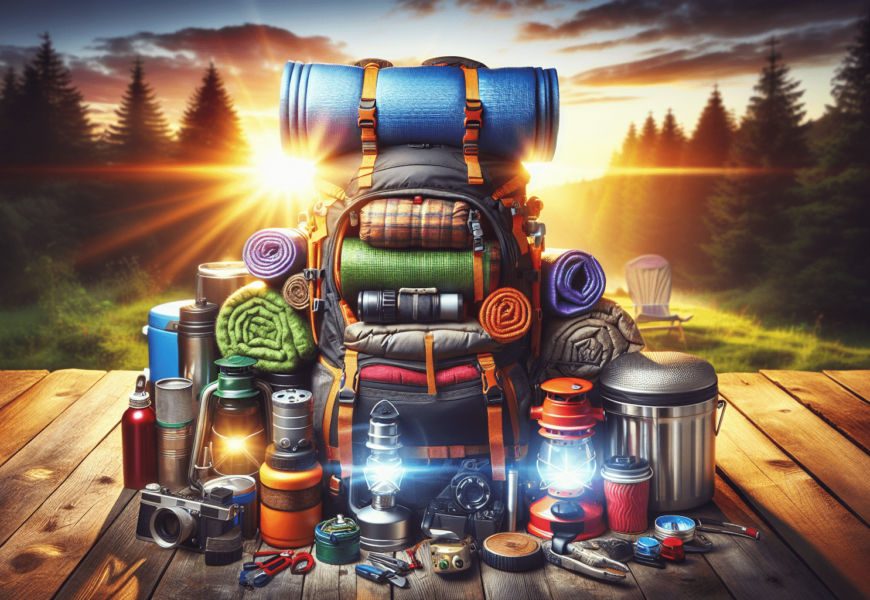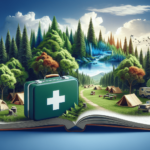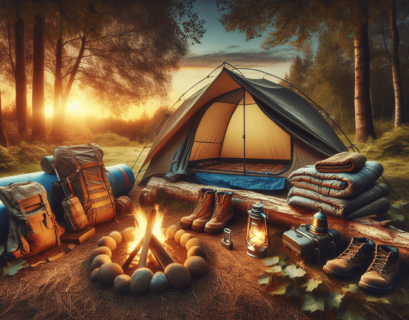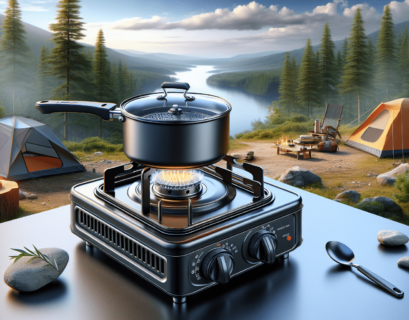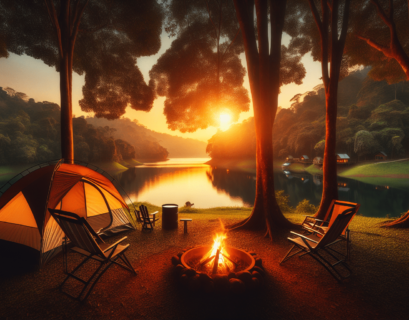Are you ready to embark on an exciting outdoor adventure camping trip? Whether you are a seasoned camper or a beginner, these 10 essential tips will ensure that your trip is a success. From choosing the right gear to planning your meals, we’ve got you covered. So grab your backpack, tighten your hiking boots, and get ready for an unforgettable experience in the great outdoors.
Uncover the Logistics and Planning
Importance of proper planning
Proper planning is crucial for a successful camping trip. It ensures that you have everything you need and minimizes the chances of any unexpected surprises. By taking the time to plan ahead, you can avoid unnecessary stress and make the most of your outdoor adventure.
Deciding on the dates
Choosing the right dates for your camping trip is an important aspect of planning. Consider factors such as weather conditions, availability of campsites, and your own schedule. Weekends and holidays tend to be popular times for camping, so make sure to book your campsite in advance if you plan to go during these busy periods.
Selecting the destination
The destination you choose for your camping trip can greatly impact your overall experience. Whether you prefer a serene lakeside campground or a rustic mountain retreat, take into account the distance, accessibility, and amenities of the campsite. Research various options and read reviews to find the perfect destination that aligns with your preferences and interests.
Checking the weather forecast
Checking the weather forecast leading up to your camping trip is essential for preparedness. Knowing what to expect in terms of temperature, precipitation, and wind conditions will help you pack appropriate clothing and gear. Be prepared for changes in weather and have a backup plan in case of inclement weather conditions.
The Relevance of Essential Camping Gear
Basic camping gear listing
To ensure a successful camping trip, it is important to have the right camping gear. Some basic camping gear you should consider bringing includes a tent, sleeping bag, camping stove, portable water filter, lantern or flashlight, camping chairs, and a cooler for food storage. Don’t forget to pack cooking utensils, plates, and cutlery as well.
Choosing the right camping gear
When selecting camping gear, prioritize quality and durability. Invest in gear that will withstand the outdoor elements and last for multiple trips. Consider the specific needs of your camping trip, such as the terrain and expected weather conditions, and choose gear accordingly. Opt for lightweight and compact options when possible to make transportation easier.
Packing and storing camping gear
Properly packing and storing your camping gear is essential for easy access and organization. Keep similar items together and utilize storage containers or bags to keep everything secure and protected. Make a packing checklist to ensure that you don’t forget any essential items. Additionally, be mindful of weight distribution within your camping gear to make it easier to carry.
Why quality camping gear is essential
Investing in quality camping gear is essential for a comfortable and enjoyable camping experience. Good gear can withstand the elements, provide better insulation, and make tasks like cooking and sleeping much easier. It’s worth spending a bit more to ensure that you have reliable gear that will enhance your outdoor adventure.
Understanding Campsite Setup Basics
Choosing a safe and ideal campsite
Selecting a safe and ideal campsite is crucial for a successful camping trip. Look for level ground that is free from hazards such as large rocks or tree branches. Consider proximity to water sources and bathrooms, as well as privacy from other campers. Take into account any regulations or restrictions in the area regarding campsite selection.
Setting up the campsite
Once you have chosen a suitable campsite, it’s time to set up your camping gear. Start by pitching your tent on level ground and ensure that it is properly secured. Set up your camping chairs and arrange your cooking and dining areas. Don’t forget to establish a designated area for storing food that is away from your sleeping area to avoid attracting animals.
Common mistakes in campsite setup
There are a few common mistakes that campers often make when setting up their campsites. One of the most common errors is pitching a tent on uneven ground, which can lead to discomfort and poor sleep. Another mistake is not properly securing the tent, which can leave it vulnerable to wind or rain. Additionally, failing to establish a designated food storage area can attract wildlife and pose a safety risk.
Essentials of a well-setup campsite
A well-setup campsite is organized, safe, and comfortable. Ensure that your tent is pitched on level ground and properly secured with stakes and guy lines. Establish designated areas for cooking, dining, and storing your camping gear. Keep your campsite clean and free from trash to minimize the impact on the environment. By setting up your campsite properly, you can create a welcoming and enjoyable outdoor living space.
Effective Food and Water Management for Camping
Planning your meals
Proper meal planning is essential for a successful camping trip. Consider the duration of your trip and the number of meals you will need to prepare. Plan meals that are easy to cook and require minimal preparation, such as one-pot meals or foil packet recipes. Make a detailed grocery list and pack non-perishable foods that are easy to store and transport.
Safe storage of food and water
Ensuring the safe storage of food and water is crucial to prevent spoilage and contamination. Store perishable foods in a cooler with plenty of ice or ice packs to maintain a safe temperature. Keep raw meats separate from other foods to avoid cross-contamination. When it comes to water, bring an ample supply or utilize a portable water filter to purify water from natural sources.
Cooking in the wild
Cooking in the wild can be a fun and rewarding part of the camping experience. Use a camping stove, grill, or campfire to prepare your meals. Follow all safety precautions when using open flames and make sure to properly extinguish any fires. Opt for easy and nutritious meals that require minimal ingredients and cook time.
Importance of hydration during camping
Staying hydrated is crucial during camping trips, especially when engaging in outdoor activities. Bring plenty of water and make sure to drink regularly throughout the day. Consider investing in a hydration pack or water bottle with a built-in filter for easy access to clean water. Avoid sugary drinks and opt for water or electrolyte-rich beverages to replenish lost fluids.
Adhering to Safety Measures and First Aid
Basic first aid knowledge and kit
Having basic first aid knowledge and a well-stocked first aid kit is essential for camping trips. Familiarize yourself with common injuries and ailments that can occur in the outdoors, such as cuts, burns, and insect bites. Pack essentials such as bandages, antiseptic wipes, insect repellent, pain relievers, and any necessary medication. Consider taking a first aid course for a more comprehensive understanding of emergency response.
Bearing awareness of animals or insects
When camping in the great outdoors, it is important to be aware of potential encounters with wildlife and insects. Research the local wildlife in the area you will be camping in and take precautions to minimize the risk of encounters. Store food securely to avoid attracting animals and know how to safely handle encounters with wildlife. Take necessary measures to protect yourself from insects by using repellents and wearing appropriate clothing.
Fire safety tips
Campfires can provide warmth and a cozy ambiance, but it is important to follow fire safety guidelines. Before starting a campfire, check if there are any fire restrictions in the area. Clear the surrounding area of any flammable materials and never leave a fire unattended. Always make sure the fire is properly extinguished before leaving the campsite or going to sleep.
Emergency plans and contacts
Prioritize safety by creating an emergency plan and familiarizing yourself with emergency contacts. Share your camping itinerary and emergency plan with trusted friends or family members. Identify the nearest medical facilities and emergency services in the area. Consider investing in a satellite phone or portable radio for communication in remote areas.
Proper Hiking and Navigational Skills
Tips for outdoor hiking
If your camping trip involves hiking trails, it is important to have proper hiking skills and knowledge. Wear appropriate footwear and clothing, and pack essentials such as a map, compass, and GPS device. Stay on marked trails and be mindful of your surroundings. Take breaks when needed and be aware of your physical limits to avoid overexertion.
Understanding trail signs
Trail signs play a crucial role in navigation while hiking. Familiarize yourself with common trail signs such as markers for direction, distance, and caution. Pay attention to any trail closures or warnings and follow them accordingly. If you are unsure about a trail sign or marker, consult your map or seek guidance from park rangers or fellow hikers.
Using a compass or GPS
Having navigational tools such as a compass or GPS device can greatly aid in finding your way during outdoor adventures. Learn how to use a compass to determine directions and navigate using a map. If using a GPS device, make sure to have spare batteries or a power source. Familiarize yourself with the features and functions of the device before your camping trip.
Preventing and responding to being lost
Even with proper planning and navigation, it is possible to get lost while camping. To prevent getting lost, always stay on marked trails and follow trail signs. If you do find yourself lost, stay calm and assess your surroundings. Consult your map and attempt to retrace your steps. If you are unable to find your way back, stay put and signal for help using visual or auditory cues.
Leave No Trace Principles
Understanding the leave no trace philosophy
The leave no trace philosophy is centered around minimizing the impact on the natural environment while enjoying outdoor activities. It emphasizes taking only memories and leaving no trace of your visit. This includes packing out all trash, not disturbing wildlife or their habitats, and avoiding activities that can cause damage to the environment.
Impact on nature and wildlife
Camping activities can have a profound impact on nature and wildlife if not done responsibly. Littering can harm wildlife and disrupt ecosystems, while improper disposal of waste can contaminate water sources. By adhering to leave no trace principles, you contribute to the preservation and conservation of the natural environment for future generations.
Pack in pack out rule
The pack in, pack out rule is a fundamental principle of leave no trace camping. It means that whatever you bring into the wilderness, you should also take with you when you leave. This includes all trash, food waste, and personal belongings. Be prepared to properly store and dispose of your waste and leave the campsite as clean as or cleaner than you found it.
Importance of cleanliness during camping
Maintaining cleanliness during camping is not only important for leave no trace principles, but also for general hygiene and well-being. Properly dispose of trash in designated containers, and avoid leaving food scraps lying around to prevent attracting animals. Practice good personal hygiene by washing your hands regularly and using biodegradable soap, if necessary.
Importance of Weather Preparedness
Understanding weather patterns
Having a basic understanding of weather patterns is important for camping trips. Monitor weather forecasts leading up to your trip and be prepared for any changes in weather conditions. Learn about the climate and weather patterns in the area you will be camping in to better prepare yourself for potential weather challenges.
Essential clothes for different weather
Packing appropriate clothing for different weather conditions is crucial for your comfort and safety. Dress in layers to adjust to changing temperatures and weather conditions. Pack rain gear, such as a waterproof jacket and pants, in case of rain. In colder temperatures, bring warm clothing, including thermal layers, hats, and gloves. Don’t forget to pack extra socks to keep your feet dry and warm.
Surviving unexpected weather change
Weather can change unexpectedly, even if you diligently checked the forecast. Be prepared for sudden weather changes by having appropriate gear and equipment. Seek shelter in your tent or a designated area if a storm or severe weather occurs. Ensure that your tent and campsite are secure to withstand strong winds or heavy rains.
Backing up plans for bad weather
Having backup plans in case of bad weather is essential to ensure the safety and enjoyment of your camping trip. Research nearby indoor activities or attractions that you can visit if the weather becomes unfavorable for outdoor activities. Consider bringing board games, books, or other forms of entertainment to keep you occupied during inclement weather.
Balancing Fun and Responsibility
Incorporating fun camping activities
Camping is not just about survival and basic needs; it is also about having fun and creating lasting memories. Incorporate fun camping activities into your trip, such as hiking, fishing, swimming, or stargazing. Bring along games, sports equipment, or musical instruments to enjoy with your fellow campers. Embrace the beauty of nature and engage in activities that bring you joy and relaxation.
Maintaining patience in emergencies
Emergencies can happen even with careful planning and preparation. It is important to maintain patience and composure in such situations. Keep a cool head and assess the situation calmly. Seek help from fellow campers or emergency services if needed. By staying calm and level-headed, you can effectively handle any emergencies that may arise.
Encouraging teamwork and participation
Camping trips are an excellent opportunity to foster teamwork and encourage participation. Assign roles and responsibilities among your camping group, such as cooking, cleaning, or firewood gathering. Engage in group activities or games that require collaboration and communication. Encourage everyone to contribute and be an active participant in the camping experience.
Setting rules and responsibilities
Setting rules and responsibilities within your camping group is important for maintaining order and ensuring a smooth camping experience. Establish guidelines for behavior, such as respecting quiet hours or designated areas. Assign tasks and responsibilities to each member to distribute the workload and promote a sense of ownership and accountability.
Post Camping Considerations
Cleaning up the campsite
Leaving the campsite in the same or better condition than you found it is a key aspect of responsible camping. Before leaving, thoroughly clean the campsite and remove all trash and debris. Properly dispose of waste in designated containers and recycle when possible. Leave nature as undisturbed as possible, taking care to leave no trace of your presence.
Reflecting on the camping experience
Take the time to reflect on your camping experience once you return home. Consider what went well and what could have been improved. Reflecting on your trip allows you to learn from your experiences and make adjustments for future camping adventures.
Analyzing what went well and what did not
Analyzing what went well and what did not during your camping trip is important for continuous improvement. Consider factors such as campsite selection, gear choice, meal planning, and overall enjoyment. Take note of any areas where you can make adjustments or improvements for your future camping trips.
Planning for the next camping trip
Lastly, start planning for your next camping trip once you have reflected on your previous experience. Use the lessons learned from your previous trip to better plan and prepare for future adventures. Research new destinations, try different camping gear, and incorporate new activities to further enhance your outdoor experiences. The planning process for your next camping trip is an exciting part of the overall journey.
In conclusion, a successful outdoor adventure camping trip is achieved through proper logistics and planning, the use of essential camping gear, understanding campsite setup basics, effective food and water management, adhering to safety measures and first aid, utilizing proper hiking and navigational skills, following leave no trace principles, preparing for weather conditions, balancing fun and responsibility, and considering post-camping clean-up and reflection. By following these comprehensive guidelines, you can ensure a memorable and enjoyable camping experience.

